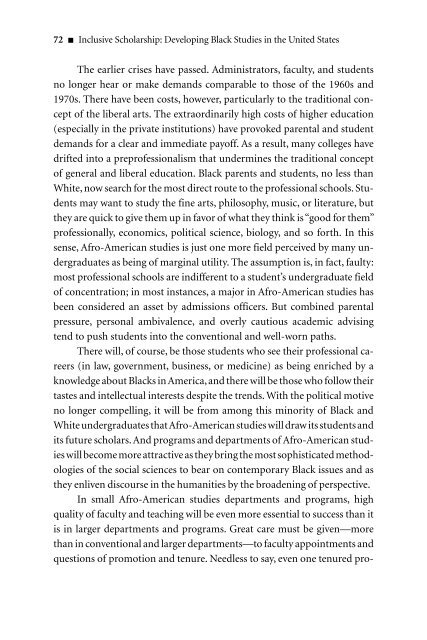Inclusive Scholarship: Developing Black Studies - Ford Foundation
Inclusive Scholarship: Developing Black Studies - Ford Foundation
Inclusive Scholarship: Developing Black Studies - Ford Foundation
You also want an ePaper? Increase the reach of your titles
YUMPU automatically turns print PDFs into web optimized ePapers that Google loves.
72 <strong>Inclusive</strong> <strong>Scholarship</strong>: <strong>Developing</strong> <strong>Black</strong> <strong>Studies</strong> in the United States<br />
The earlier crises have passed. Administrators, faculty, and students<br />
no longer hear or make demands comparable to those of the 1960s and<br />
1970s. There have been costs, however, particularly to the traditional concept<br />
of the liberal arts. The extraordinarily high costs of higher education<br />
(especially in the private institutions) have provoked parental and student<br />
demands for a clear and immediate payoff. As a result, many colleges have<br />
drifted into a preprofessionalism that undermines the traditional concept<br />
of general and liberal education. <strong>Black</strong> parents and students, no less than<br />
White, now search for the most direct route to the professional schools. Students<br />
may want to study the fine arts, philosophy, music, or literature, but<br />
they are quick to give them up in favor of what they think is“good for them”<br />
professionally, economics, political science, biology, and so forth. In this<br />
sense, Afro-American studies is just one more field perceived by many undergraduates<br />
as being of marginal utility. The assumption is, in fact, faulty:<br />
most professional schools are indifferent to a student’s undergraduate field<br />
of concentration; in most instances, a major in Afro-American studies has<br />
been considered an asset by admissions officers. But combined parental<br />
pressure, personal ambivalence, and overly cautious academic advising<br />
tend to push students into the conventional and well-worn paths.<br />
There will, of course, be those students who see their professional careers<br />
(in law, government, business, or medicine) as being enriched by a<br />
knowledge about <strong>Black</strong>s in America,and there will be those who follow their<br />
tastes and intellectual interests despite the trends. With the political motive<br />
no longer compelling, it will be from among this minority of <strong>Black</strong> and<br />
White undergraduates thatAfro-American studies will draw its students and<br />
its future scholars. And programs and departments of Afro-American studies<br />
will become more attractive as they bring the most sophisticated methodologies<br />
of the social sciences to bear on contemporary <strong>Black</strong> issues and as<br />
they enliven discourse in the humanities by the broadening of perspective.<br />
In small Afro-American studies departments and programs, high<br />
quality of faculty and teaching will be even more essential to success than it<br />
is in larger departments and programs. Great care must be given—more<br />
than in conventional and larger departments—to faculty appointments and<br />
questions of promotion and tenure. Needless to say, even one tenured pro-

















